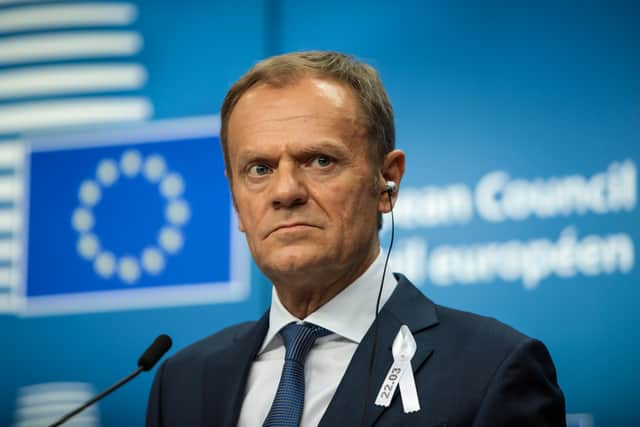Poland election: who is Donald Tusk, what does his party stand for - as results suggest Law and Justice ousted


Donald Tusk, the leader of the Polish opposition, has declared the start of a new era for his nation after opposition parties appeared to garner enough votes in Sunday's (15 October) parliamentary elections to unseat the ruling nationalist conservative party.
According to exit polls, the incumbent Law and Justice party won the most seats, but not enough to form a government which can pass laws.
Advertisement
Hide AdAdvertisement
Hide AdThe Ipsos exit poll suggested Law and Justice obtained 200 seats and the far-right Confederation – a likely partner – got 12 seats, a showing the party acknowledged was a defeat.
The final results have not been reported by the state electoral commission, which has said it expects to report the final result early on Tuesday (17 October).
Three opposition parties are likely to have won a combined 248 seats in the 460-seat lower house of parliament, the Sejm. Civic coalition, the largest of the groups led by former prime minister and ex-European Union president Tusk, won 31.6% of the votes, the exit poll said.
Tusk told his supporters: “I have been a politician for many years. I’m an athlete. Never in my life have I been so happy about taking seemingly second place. Poland won. Democracy has won. We have removed them from power.
Advertisement
Hide AdAdvertisement
Hide Ad“This result might still be better, but already today we can say this is the end of the bad time, this is the end of Law and Justice rule.”
Tusk’s Civic Coalition and rival opposition parties, Third Way and the New Left, ran on separate tickets but with the same promises of seeking to oust Law and Justice and restore good ties with the European Union.
But who exactly is Donald Tusk? What does his party stand for and what does the result really mean for Poland? Here is everything you need to know about it.
Who is Donald Tusk?


Tusk served as the leader of Poland's Civic Platform leader, and later as the county's Prime Minister from 2007 to 2014.
Advertisement
Hide AdAdvertisement
Hide AdTusk's government implemented a range of economic reforms aimed at modernising and liberalising Poland's economy, including tax cuts and pension system changes. Under his leadership, Poland became one of the fastest-growing economies in the European Union.
His government also prioritised infrastructure development, including investments in roads, railways and other critical transportation projects, initiatives aimed to improve connectivity within Poland and enhance the country's economic competitiveness.
The Tusk government also pursued a range of social policies, including efforts to improve healthcare and education. While these areas faced challenges and criticisms, they remained important priorities during his tenure.
Tusk's time as Prime Minister is often seen as a period of relative political stability and economic growth in Poland, and his pro-European stance and efforts to modernise the country's economy earned him popularity among many Poles.
Advertisement
Hide AdAdvertisement
Hide AdAfter his tenure as Prime Minister of Poland, Tusk became a prominent European politician. He served as the President of the European Council from 2014 to 2019, and played a crucial part in shaping EU policies and decisions, especially during challenging times such as the Greek financial crisis and the Brexit negotiations.
What is Civic Platform?
Tusk was one of the co-founders of the political party Civic Platform (Platforma Obywatelska, or PO) in 2001, a centre-right party that positions itself as a party that promotes market-oriented economic policies, fiscal responsibility and social liberalism.
It generally supports a free-market economy, individual liberties and a moderate social welfare system, and is pro-European and has generally been supportive of Poland's EU membership and integration into European institutions.
This pro-EU stance was particularly evident during the time when Tusk served as Prime Minister and later as President of the European Council, and Civic Platform also champions liberal values, including support for civil rights, individual freedoms and social issues such as LGBTQ+ rights and women's rights.
Advertisement
Hide AdAdvertisement
Hide AdCivic Platform has been part of several coalition governments and has held the position of Prime Minister in Poland. It is considered one of the two major political parties in the country, along with the Law and Justice Party (PiS), which is generally more conservative and right-wing.
Comment Guidelines
National World encourages reader discussion on our stories. User feedback, insights and back-and-forth exchanges add a rich layer of context to reporting. Please review our Community Guidelines before commenting.
